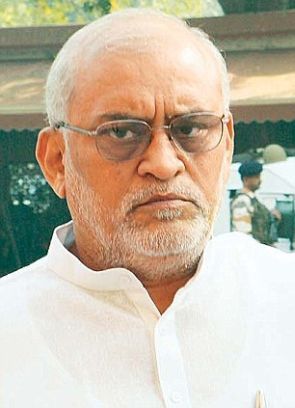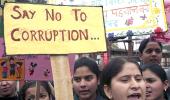'The CBI and its independence was discussed in great detail. We invited and sought the views of the CBI director as well as several government officials. But the ingenious solution to the problem came from within the committee.'
'The effort was to somehow find a solution. It would not have been possible to draft this Bill if members had not been liberal in their views and if they had not been prepared to rid themselves of their political bias.'
Congress MP Satyavrat Chaturvedi, who headed the Parliamentary committee which proposed the recommendations for the Lokpal Bill, speaks to Anita Katyal in an exclusive interview.
 Congress MP Satyavrat Chaturvedi was chairman of the select Parliamentary committee entrusted with the task of reconciling the differences of various political parties on the Lokpal Bill and coming up with a draft legislation that would be acceptable to all.
Congress MP Satyavrat Chaturvedi was chairman of the select Parliamentary committee entrusted with the task of reconciling the differences of various political parties on the Lokpal Bill and coming up with a draft legislation that would be acceptable to all.
The difficult task was eventually achieved after prolonged deliberations and debate in the committee, which delivered a unanimous report.
Chaturvedi's efforts in forging a consensus were appreciated by leaders from across the political spectrum.
Both Bharatiya Janata Party leader Arun Jaitley, the Leader of the Opposition in the Rajya Sabha, and Communist Party of India-Marxist MP Sitaram Yechury made a special mention of Chaturvedi's deft handling of the committee meetings in their speeches during the debate on the Lokpal Bill in the Rajya Sabha.
In an exclusive interview with Anita Katyal, Chaturvedi reveals how he narrowed down the divergent viewpoints to come up with recommendations which had the concurrence of all political parties and civil rights groups.
You came in for great praise from Opposition leaders during the debate on the Lokpal Bil in the Rajya Sabha for the manner in which you chaired the select committee and were able to come out with a unanimous report.
How difficult was it to forge a consensus given the differing views of the members?
The Lokpal Bill has been one of the most contentious Bills discussed in Parliament. Naturally it was not an easy task to arrive at a consensus as there were divergent views on the subject in all the political parties and they all stuck to their stated position.
A lot of legal and constitutional issues had to be resolved to bring about unanimity among the committee members.
But there was also a view in the committee that we had to reach a consensus to establish the credibility of the political class and the system in view of the overwhelming public mood against the political class and its inability to fight with corruption effectively.
More importantly, it was felt that everybody should contribute honestly and effectively to create an institution which would deal effectively with the rampant corruption in the country.
We all know that political parties have different views, but we had to narrow our differences to come out with a reasonable solution.
I am glad that members rose above their political bias to achieve a larger objective.
What were the main sticking points?
For one, the Opposition parties wanted the institution of the Lokpal as well as all subsidiary investigating agencies to be independent of government influence.
Second, they wanted the federal structure of the country and the powers of the states to remain intact.
Given these positions, we had to find a solution to these objections raised by representatives of different parties with regard to these two issues.
To deal with their views, we first listed the points of difference and then began deliberations on each point one after the other.
Over a period of time we were able to reconcile our differences. We did so by consulting legal luminaries, Constitutional experts and representatives of civil rights groups -- we must have interacted with about 25 experts from different fields.
The CBI and its independence was discussed in great detail.
We invited and sought the views of the CBI director as well as several government officials. But the ingenious solution to the problem came from within the committee.
The effort was to somehow find a solution. It would not have been possible to draft this Bill if members had not been liberal in their views and if they had not been prepared to rid themselves of their political bias.
That was the key to this entire exercise.
Could you give us a sense of the discussions which took place in the committee meetings?
The pros and cons of all issues were discussed in great detail.
For instance, there were strong reservations about giving the CBI total independence from the government and there were sound reasons for it.
One member even remarked that by giving the CBI complete autonomy, they could end up creating a Frankenstein's monster like the ISI of Pakistan.
Then, we discovered to our amazement that no investigative agency anywhere in the world is free of government control and such an exception would prove to be dangerous.
We, therefore, suggested a measure which would make the CBI effective in handling corruption cases and, at the same time, allow the government to retain administrative control over it.
How was that achieved?
It was finally agreed that all investigative agencies, whether it is the CBI or the state police, would all fall within the ambit of the Lokpal.
The Lokpal can order an investigation into a corruption case by any of these agencies.
There was also agreement that officers investigating the Lokpal-related cases shall do so under the supervision of the Lokpal and that these officers cannot be transferred by the government without the consent of the ombudsman.
On the second issue, as we all know, the federal structure of our Constitution lays down separate powers for the states and the Centre.
The representatives of the regional parties raised objections to the enactment of a Bill by Parliament which would deal with officers of state governments.
This, they argued, would violate the federal spirit of the Constitution. But it was equally essential to ensure that Lokayuktas were set up in each state.
After a lot of deliberation, it was eventually decided to delete part 3 of the original Bill dealing with the creation of Lokayuktas.
This Bill has instead made it mandatory that each state shall set up a Lokayukta within 365 days of the passage of the Lokpal Bill.
Here again, we achieved a balance between different views -- we made it mandatory for state governments to set up Lokayuktas and, at the same time, left it to the state governments to create an institution which is suitable to their conditions.
Nevertheless, there is a view that the investigating agencies will now have to report to multiple bosses.
That is not wholly correct. Only those officers who have been entrusted with cases by the Lokpal will be answerable to the ombudsman, but all other officers who are handling other cases shall work independently.
This is the case with the CBI as well as other investigative agencies.
How do you respond to the criticism that it was unnecessary to create another structure like the Lokpal when we already have enough laws to handle corruption cases?
There was general agreement in the committee that if all the existing laws had dealt effectively with combating corruption, the need for a Lokpal would not have arisen.
These laws did not pass the test of time. So we needed to create an institution to deal with corruption in high places.
A lot of questions have also been raised about the timing of the passage of the Bill. It is felt that the government rushed ahead with the Bill after the Congress party's humiliating defeat in the recent assembly elections and four months ahead of the Lok Sabha election.
That is ridiculous!
In a democratic system, nothing happens quickly as a lot of impediments keep coming up. In this case, the select committee submitted its report within four months, but then other issues like the Food Security Bill and Land Acquisition Bill took priority.
Unfortunately, last several sessions of Parliament have failed to transact any business. It is easy to say it should have been done earlier, but when session after session has been disrupted, how can you blame the government for the delay?
There is a long list of Bills which have been pending for over a year, but could not be taken up because of the disruptions by the Opposition.
There is also a view that the Bill was brought to create a divide between Anna Hazare and Aam Admi Party leader Arvind Kejriwal...
That is a funny thing to say. If we do something, we are told that we are trying to create a wedge between Anna and Kejriwal.
And if we had not brought the Bill, we would have been accused of relinquishing our responsibilities and not being serious about combating corruption.
Don't you think that you are entrusting immense powers to an institution, which is unaccountable unlike elected representatives?
The Lokpal is not without safeguards. But then there is always a possibility of misuse of any law, why only the Lokpal?
Here again, there are differing views. Some say, it should be further strengthened while others maintain the Lokpal has been given too much power.
In a democracy, there can be different views, but that does not mean we should shy away from taking decisions.
Time will prove the utility of a Lokpal.
How does the Congress propose to get political mileage from this move?
I had a limited mandate as chairman of the select committee to reconcile the divergent views of the different political parties. I have been able to do so.
The politics of this Bill will be decided by the party leadership.
It was reported that Anna Hazare called you and thanked you for resolving all contentious issues.
We have been in touch. Anna promised to give his constructive support provided the government did not dilute the select committee's recommendations. He welcomed the report.










